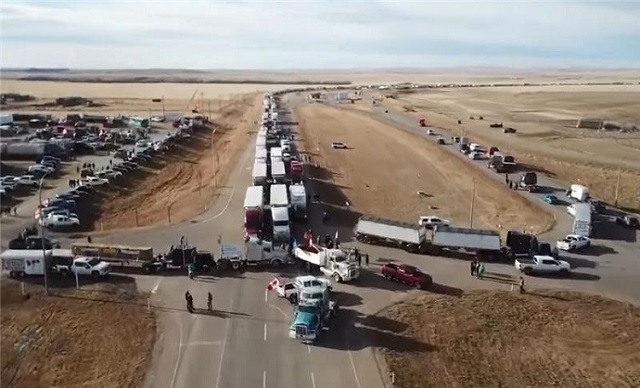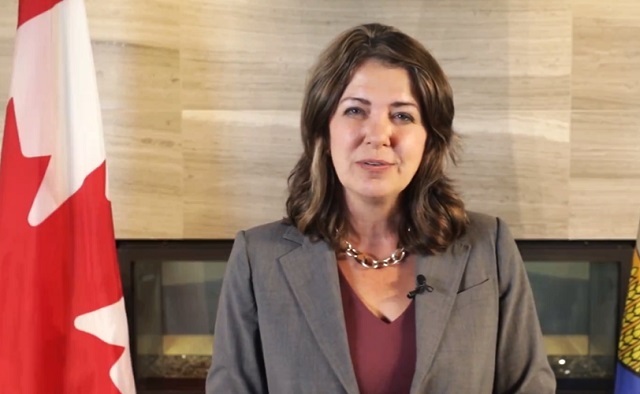Alberta
Province of Alberta puts criminals on notice!

Ministers Jason Nixon, Rick Wilson and Doug Schweitzer announced further steps to combat rural crime, which includes expanded authorities and roles for Government of Alberta peace officers from the Fish and Wildlife Enforcement Branch, Commercial Vehicle Enforcement Branch and the Alberta Sheriffs.
From The Province of Alberta
Government announces plan to combat rural crime
The province is standing up for rural Albertans by acting on concerns to deter crime, reinforce property rights and give victims a stronger voice in the justice system.
“We are sending a strong signal to rural Albertans who have been victimized for far too long. We have listened to you. We have heard you. And we are standing with you. We want to ensure you know that we are going to do everything we can as a provincial government to help you feel safe in your communities.”
“In many ways, rural communities are the heart of this province – hard-working, salt-of-the-earth, and always ready and willing to lend a hand to a neighbour in need. It’s heartbreaking to see the scourge of criminal activity worsen in these communities over the past several years, and we need to take action. This is an issue that affects many in my own community, and it is one that I take very seriously. As we promised, our government is taking immediate steps to make sure everyone feels safe and secure in their homes and in their communities.”
Integrating provincial peace officers
In rural areas, police can be stretched across large distances, which can lead to longer response times. To help reduce response times, the government will create the Rural Alberta Provincial Integrated Defence Force – the RAPID Force – by expanding the roles and authorities of 400 peace officers in the Fish and Wildlife Enforcement Branch, Commercial Vehicle Enforcement Branch and the traffic arm of the Alberta Sheriffs. The changes will allow these officers to respond to a wider range of calls and to assist the RCMP and other police services in some emergencies.
Training and related planning is underway, to have the first of these officers available to assist rural Albertans by fall 2020.
Strengthening property rights
To defend the rights of law-abiding property owners, the government will introduce changes to the Occupiers’ Liability Act. These changes would eliminate the liability of law-abiding property owners who are protecting their property against trespasses who are, or who are believed to be, in the commission of a criminal act. This provision will be retroactive to Jan. 1, 2018.
To strengthen trespass laws and further defend property rights, planned legislation includes a proposed five-fold increase to the maximum fines for trespassing offences, with fines of up to $10,000 for a first violation and $25,000 for subsequent offences, as well as possible prison time of up to six months. Corporations that help or direct trespassers would face fines up to $200,000. In addition to these increases, a proposed change would increase the maximum amount a court can order for loss of or damage to property from $25,000 to $100,000.
The planned legislation would amend the Petty Trespass Act to add explicit references to better capture land used for crops, animal-rearing and bee-keeping.
A proposed biosecurity regulation under the Animal Health Act would create offences and penalties for people who enter agricultural operations without authorization or encourage others to do so. Such incidents can introduce disease and threaten the welfare of animals.
Cracking down on metal theft
Government has proclaimed the Scrap Metal Dealers and Recyclers Identification Act to deter metal theft by making it more difficult for criminals to monetize stolen material by selling it for scrap.
Metal theft is a significant public safety risk. Thieves terrify property owners by trespassing and stealing materials such as copper wire and industrial batteries and frequently damage and interfere with critical systems like electrical lines, telecommunications cables and transportation infrastructure.
Criminals often steal metal from property owners and critical infrastructure in isolated areas to avoid detection. This has also made rural Albertans a target of trespassers and thieves looking for metal.
The Scrap Metal Dealers and Recyclers Identification Act was passed in 2012, but never proclaimed. An Order in Council signed Nov. 5 puts the legislation into effect immediately.
Regulations outlining requirements on dealers and recyclers to obtain proof of identification from sellers, record and retain details of transactions and share information with law enforcement will be in place by spring 2020. There is also an immediate requirement for scrap metal dealers and recyclers to report any suspected stolen property in their possession to authorities.
A new voice for victims
Community impact statements will recognize the far-reaching effects of a crime and how an entire community can suffer harm or loss.
A new program will enable communities to take part in the sentencing of offenders by letting them submit a statement describing how the crime has affected the community as a whole – including the emotional, physical and economic impact, or fears they may have for their own security.
A community impact statement could be written on behalf of any group of people, such as those in a geographic area, diverse segments of the population, and groups affected by the crime.
Community impact statement forms will be available online in early January.
There will also be additional support for victims, via a new Restitution Recoveries Program. The program will help victims collect outstanding payments on restitution orders by giving government the authority to use enforcement measures against offenders, such as garnishing wages or seizing and selling property, as needed.
This program will reduce red tape for victims who would otherwise have to navigate the legal system and attempt to collect court-ordered restitution at their own risk, effort and expense.
Alberta
Alberta awash in corporate welfare

From the Fraser Institute
By Matthew Lau
To understand Ottawa’s negative impact on Alberta’s economy and living standards, juxtapose two recent pieces of data.
First, in July the Trudeau government made three separate “economic development” spending announcements in Alberta, totalling more than $80 million and affecting 37 different projects related to the “green economy,” clean technology and agriculture. And second, as noted in a new essay by Fraser Institute senior fellow Kenneth Green, inflation-adjusted business investment (excluding residential structures) in Canada’s extraction sector (mining, quarrying, oil and gas) fell 51.2 per cent from 2014 to 2022.
The productivity gains that raise living standards and improve economic conditions rely on business investment. But business investment in Canada has declined over the past decade and total economic growth per person (inflation-adjusted) from Q3-2015 through to Q1-2024 has been less than 1 per cent versus robust growth of nearly 16 per cent in the United States over the same period.
For Canada’s extraction sector, as Green documents, federal policies—new fuel regulations, extended review processes on major infrastructure projects, an effective ban on oil shipments on British Columbia’s northern coast, a hard greenhouse gas emissions cap targeting oil and gas, and other regulatory initiatives—are largely to blame for the massive decline in investment.
Meanwhile, as Ottawa impedes private investment, its latest bundle of economic development announcements underscores its strategy to have government take the lead in allocating economic resources, whether for infrastructure and public institutions or for corporate welfare to private companies.
Consider these federally-subsidized projects.
A gas cloud imaging company received $4.1 million from taxpayers to expand marketing, operations and product development. The Battery Metals Association of Canada received $850,000 to “support growth of the battery metals sector in Western Canada by enhancing collaboration and education stakeholders.” A food manufacturer in Lethbridge received $5.2 million to increase production of plant-based protein products. Ermineskin Cree Nation received nearly $400,000 for a feasibility study for a new solar farm. The Town of Coronation received almost $900,000 to renovate and retrofit two buildings into a business incubator. The Petroleum Technology Alliance Canada received $400,000 for marketing and other support to help boost clean technology product exports. And so on.
When the Trudeau government announced all this corporate welfare and spending, it naturally claimed it create economic growth and good jobs. But corporate welfare doesn’t create growth and good jobs, it only directs resources (including labour) to subsidized sectors and businesses and away from sectors and businesses that must be more heavily taxed to support the subsidies. The effect of government initiatives that reduce private investment and replace it with government spending is a net economic loss.
As 20th-century business and economics journalist Henry Hazlitt put it, the case for government directing investment (instead of the private sector) relies on politicians and bureaucrats—who did not earn the money and to whom the money does not belong—investing that money wisely and with almost perfect foresight. Of course, that’s preposterous.
Alas, this replacement of private-sector investment with public spending is happening not only in Alberta but across Canada today due to the Trudeau government’s fiscal policies. Lower productivity and lower living standards, the data show, are the unhappy results.
Author:
Alberta
‘Fireworks’ As Defence Opens Case In Coutts Two Trial

From the Frontier Centre for Public Policy
By Ray McGinnis
Anthony Olienick and Chris Carbert are on trial for conspiracy to commit murder and firearms charges in relation to the Coutts Blockade into mid-February 2022. In opening her case before a Lethbridge, AB, jury on July 11, Olienick’s lawyer, Marilyn Burns stated “This is a political, criminal trial that is un Canadian.” She told the jury, “You will be shocked, and at the very least, disappointed with how Canada’s own RCMP conducted themselves during and after the Coutts protest,” as she summarized officers’ testimony during presentation of the Crown’s case. Burns also contended that “the conduct of Alberta’s provincial government and Canada’s federal government are entwined with the RCMP.” The arrests of the Coutts Four on the night of February 13 and noon hour of February 14, were key events in a decision by the Clerk of the Privy Council, Janice Charette, and the National Security Advisor to the Prime Minister, Jody Thomas, to advise Prime Minister Justin Trudeau to invoke the Emergencies Act. Chief Justice Paul Rouleau, in submitting his Public Order Emergency Commission Report to Parliament on February 17, 2023, also cited events at the Coutts Blockade as key to his conclusion that the government was justified in invoking the Emergencies Act.
Justice David Labrenz cautioned attorney Burns regarding her language, after Crown prosecutor Stephen Johnson objected to some of the language in the opening statement of Olienick’s counsel. Futher discussion about the appropriateness of attorney Burns’ statement to the jury is behind a publication ban, as discussions occurred without the jury present.
Justice Labrenz told the jury on July 12, “I would remind you that the presumption of innocence means that both the accused are cloaked with that presumption, unless the Crown proves beyond a reasonable doubt the essential elements of the charge(s).” He further clarified what should result if the jurors were uncertain about which narrative to believe: the account by the Crown, or the account from the accused lawyers. Labrenz stated that such ambivalence must lead to an acquittal; As such a degree of uncertainty regarding which case to trust in does not meet the “beyond a reasonable doubt” threshold for a conviction.”
On July 15, 2024, a Lethbridge jury heard evidence from a former employer of Olienicks’ named Brian Lambert. He stated that he had tasked Olienick run his sandstone quarry and mining business. He was a business partner with Olienick. In that capacity, Olienick made use of what Lambert referred to as “little firecrackers,” to quarry the sandstone and reduce it in size. Reducing the size of the stone renders it manageable to get refined and repurposed so it could be sold to buyers of stone for other uses (building construction, patio stones, etc.) Lambert explained that the “firecrackers” were “explosive devices” packaged within tubing and pipes that could also be used for plumbing. He detailed how “You make them out of ordinary plumbing pipe and use some kind of propellant like shotgun powder…” Lambert explained that the length of the pipe “…depended on how big a hole or how large a piece of stone you were going to crack. The one I saw was about six inches long … maybe an inch in diameter.”
One of Olienick’s charges is “unlawful possession of an explosive device for a dangerous purpose.” The principal evidence offered up by RCMP to the Crown is what the officers depicted as “pipe bombs” which they obtained at the residence of Anthony Olienick in Claresholm, Alberta, about a two-hour drive from Coutts. Officers entered his home after he was arrested the night of February 13, 2022. Lambert’s testimony offers a plausible common use for the “firecrackers” the RCMP referred to as “pipe bombs.” Lambert added, these “firecrackers” have a firecracker fuse, and in the world of “explosive” they are “no big deal.”
Fellow accused, Chris Carbert, is does not face the additional charge of unlawful possession of explosives for a dangerous purpose. This is the first full week of the case for the defence. The trial began on June 6 when the Crown began presenting its case.
Ray McGinnis is a Senior Fellow with the Frontier Centre for Public Policy who recently attended several days of testimony at the Coutts Two trial.
-

 Brownstone Institute2 days ago
Brownstone Institute2 days agoThe Media Refuses to Accept Covid Reality
-

 Alberta2 days ago
Alberta2 days ago‘Fireworks’ As Defence Opens Case In Coutts Two Trial
-

 National2 days ago
National2 days agoLiberals offer no response as Conservative MP calls Trudeau a ‘liar’ for an hour straight
-

 COVID-191 day ago
COVID-191 day agoLeaked documents: German gov’t lied about shots preventing COVID, knew lockdowns did more harm than good
-

 Business1 day ago
Business1 day agoFederal government seems committed to killing investment in Canada
-

 International1 day ago
International1 day agoSwitzerland’s new portable suicide ‘pod’ set to claim its first life ‘soon’
-

 Business1 day ago
Business1 day agoEstonia’s solution to Canada’s stagnating economic growth
-

 Economy1 day ago
Economy1 day agoKamala Harris’ Energy Policy Catalog Is Full Of Whoppers






